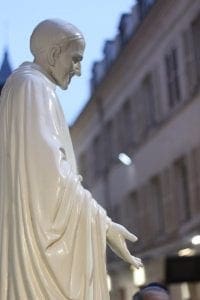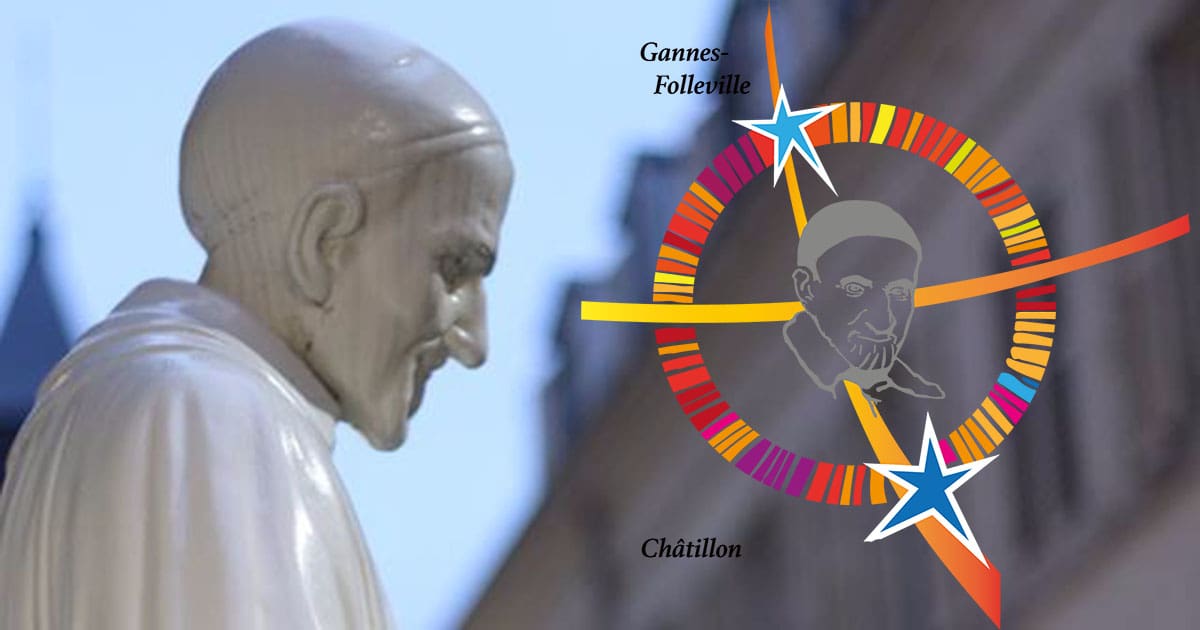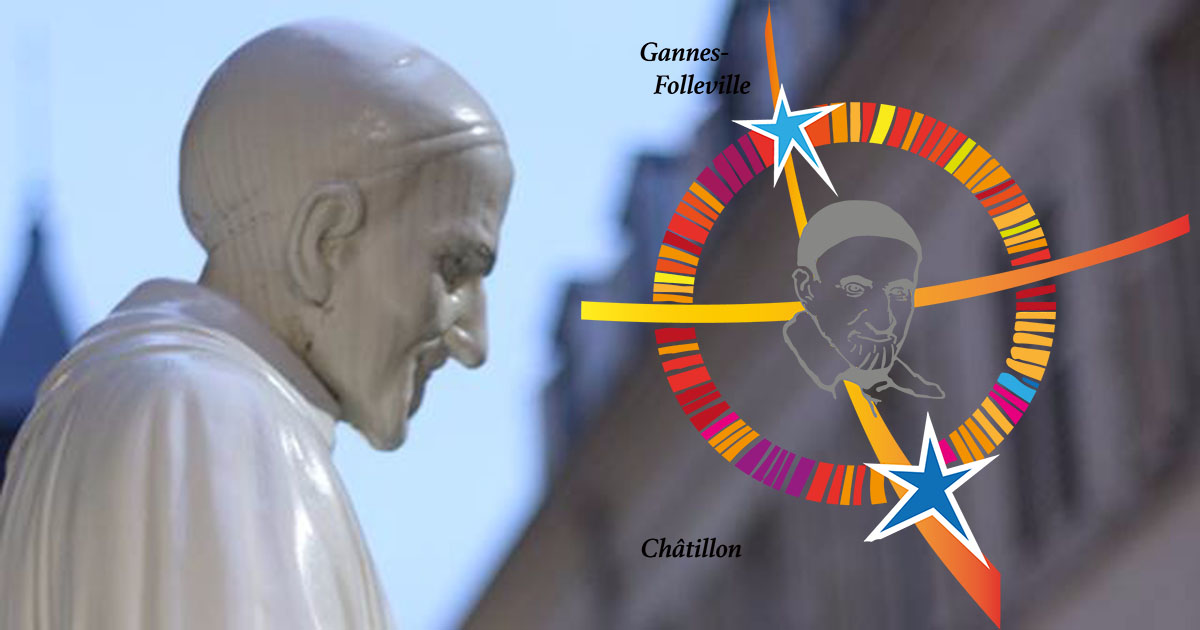400 Years – A Time to Step Back
In a reflection “Four Hundred Years Since the Birth of the Vincentian Charism: A Time to Remember, a Time to Strengthen Our Identity And a Time for Prophecy” Fr. José Antonio González P., CM invites us to step back to see the wider horizons of our Vincentian Charism:
Introduction
Every day, in a seemingly unconscious manner, history is written as we engage in our daily activities. It is for that reason that we are often unaware of various moments of conquest/victory or moments of defeat/mediocrity. Therefore, we need significant moments that help us to look up, and to distance ourselves from that which is obvious so that in a prayerful and reflective manner we might discover the intensity of the call that has echoed through a history that has been written with God and written through the labor of our common praxis.
The celebration of the 400th anniversary of the birth of the Vincentian charism, which began on January 25th, is a significant event that also provides us with a good reason for serious reflection. This article is intended to raise some spiritual concerns about our celebration. I have divided the text into three sections which refer to three distinct but complimentary horizons of our historical view: the past (remembrance), the present (identity) and the future (prophesy).
1. Grateful remembering
 Gratitude arises from the discovery of the graciousness of God’s love, which at the same time is the source of the gift of life. In light of God’s goodness which led God to become incarnated in history and allowed divine life to flourish in the human person, men and women (from the depths of their being and in all their activity) are grateful for the gift of grace which constitutes their being. With regard to divine gratitude, we are aware of Vincent’s affirmations when he spoke about the origin of the Vincentian charism … he always stated that such was the result of the gracious and surprising providence of God.
Gratitude arises from the discovery of the graciousness of God’s love, which at the same time is the source of the gift of life. In light of God’s goodness which led God to become incarnated in history and allowed divine life to flourish in the human person, men and women (from the depths of their being and in all their activity) are grateful for the gift of grace which constitutes their being. With regard to divine gratitude, we are aware of Vincent’s affirmations when he spoke about the origin of the Vincentian charism … he always stated that such was the result of the gracious and surprising providence of God.
During the time of this celebration, for what are we grateful? We are grateful for everything! We are grateful, for the life of Saint Vincent and his openness to God’s merciful designs for his life. We are grateful for the power of a creative charism which opened the path that allowed comfort to be communicated to the poor and hope to be transmitted to the Church. We are grateful for the perseverance of countless individuals and institutions, a firmness that was revealed when confronting difficult situations. We are grateful for the ministry and the generous dedication of so many men and women who clothed themselves in the Vincentian spirit and who knew how to become credible witnesses of that love which transforms everything: the martyrs, the deceased, the infirm, and the elderly. We are grateful for the interior joy that rises up as a result of work well done and the silent tears that flow from the difficulties of oblative love.
We are also grateful for the great works of charity that can be seen as small victories in our service on behalf of the poor. We are grateful for missionary zeal and outreach, as well as for the many insights that enable us, as a Vincentian Family, to renew our heritage. We are grateful for the recognition that we have received, especially the recognition as revealed on the joyful and hopeful faces of the poor and on the countless faces of men and women who experienced the affective and effective love of the Family. We are grateful for the call of charity which is alive in our hearts and we are equally grateful for the dreams and visions that move us to action.
2. Focus on identity
The past is viewed with gratitude and the present is viewed with realism and from the perspective of our convictions. We are very aware of the fact that many people live in situations of poverty and that those same men and women cry out and demand our service. The Vincentian charism is alive and relevant in the midst of our present-day world. Our charism motivates many people to become witnesses who respond to the urgent calls of charity. Indeed, countless men and women offer their very lives and become signs of hope to those persons who are marginalized and abandoned. Today, more than ever before, we are aware of the fact that we are a family and as such we have emphasized a common ministry and mission that the present reality demands.
We, however, are also aware of the social-cultural and religious crisis and we know that the same crisis has serious consequences with regard to the vitality and the renewal of the Vincentian charism. We experience certain difficulties in promoting vocations for the religious and consecrated life and similar difficulties in fostering volunteers who will persevere in their commitment. We are an aging society and often the vitality of our charism has been relegated to the situation of preserving things as they have always been. In some places, such a position has led to pessimism and as a result “individualism” has invaded our common mission. The poor are not always our burden and our concern … and our charity has led to a certain bureaucracy which has robbed our service of its warmth.
Perhaps one of the greatest difficulties, if not the most fundamental difficulty, for the vitality and renewal of the charism is that an improper zeal has clouded the horizon and as a result the gospel meaning that ought to accompany our practice of charity is not clearly seen or understood. God the Father, in Christ Jesus and through means of the Holy Spirit, has called us to be messengers of God’s mercy toward those who are poor. That ontological conviction and contemplative reality characterizes our service and enables us to avoid the trap of activism (seeking immediate results) in our ministry on behalf of those who are poor … an activism that makes our efforts sterile when attempting to love in an effective manner. There is no doubt that this problem has been present since the very beginning, but today, as a result of the secular conditions of our society, this has become a significant difficulty when trying to explain and to concretize our spiritual identity and the scope of our service.
In light of the 400th anniversary of the birth of our charism, what should we emphasize? We should emphasize our identity! Our identity leads us to the source and the content of our passion, namely, God. In everyday life when someone identifies with some particular thing or person, one’s feelings are expressed with passion and conviction (for example, when one identifies with a particular sports team or some musical/movie star). We, then, as heirs of the Vincentian charism, are we passionate about Christ as the One who gives meaning to our life and to our commitment?
It is clear that there is no experience of God if there is no intimacy with Jesus Christ. A true experience of God involves a passionate following of the Teacher and a feeling of being seduced by him, that is, seduced by his plan and by his vision of the Kingdom, seduced in such a way that we come to realize that it is worthwhile to live and die for the Teacher. Our passion for Christ should be such that we experience a profound joy and strength and are willing to assume even greater risks in our service on behalf of the poor. To take this conviction for granted or to marginalize it in our activity is to reduce our spirituality to abstractions and to empty our activity of meaning.
3. Prophetic future
To be grateful, to confront and to emphasize in order to reconfigure and provoke. The future is not always clear because we have no control over it. We can, however, view the future in two different ways: [1] we can approach the future with fear of that which is unexpected. Therefore, in order to feel secure, we will then seek refuge in the way things have always been done; [2] we can approach the future with hope, trusting that everything we can intuit and accomplish is part of God’s plan. I believe that the Vincentian attitude that is in greater harmony with our charism, is found in the second approach.
So then, how do we open ourselves with confidence to the future that is on the horizon as we celebrate the 400th anniversary of the birth of our charism? We do this by being fearless … fearless in admitting that our pastoral praxis may have become obsolete and that we need an interior and exterior reconfiguration, a reconfiguration that is sincere and prophetic … fearless as we affirm our willingness to embrace the pain and the suffering of a world that does not yet exist and at the same time accepting the reality of the present day world … fearless in admitting our ignorance and thus, allowing ourselves to be enlightened by others who, like ourselves, are engaged in the struggle for a more just and a more human world … fearless in our belief in the power of team work and in the vitality that results from moving out beyond our comfort zone … fearless in allowing ourselves to feel vulnerable as a result of misunderstanding … fearless in allowing ourselves to feel the loneliness of the Garden of Gethsemane.
Fearless in opening ourselves to the new forms of poverty and the new ways of understanding the human person and God … fearless in expressing our joy and our convictions, even when no one asks us to do this … fearless in sharing our time, our abilities, our material goods and our feelings … fearless in confronting our own mediocrities and then, making every effort to overcome them, knowing that if we are open to the will of God, then God will always guide our steps.
Conclusion
It is clear that as we celebrate the 400th anniversary of the birth of the Vincentian charism, we are not only referring to a positive and an important event, but rather for all of us who rejoice in having this charism on the horizon of our life and our activity, we now have the responsibility to reflect on its meaning and relevance. In that way we can come to a deeper understanding of our need to be grateful to the One who is the origin of our charismatic life, to deepen our identity with the Teacher who has called us to open ourselves fearlessly and hopefully to the future and to view the future as a gift of God.
Source: http://cmglobal.org/
Translated: Charles T. Plock, CM
Tags: famvin400








Thank you for this beautiful article on what this 400th anniversary of our Vincentiian Charism can be an inspiring and disturbing challenge to us in the Vincentian Family. We may have grandiose celebrations, but after that, what stays? what grows? where are the tangible and intangible landmarks and expressions that will invigorate us personally and the Poor? May this anniversary become a living momentsary on our missionary journey as children of St. Vincent who has given us a timeless legacy to be more and more like Jesus. What a great blessing it is to be a member of the family of St. Vincent de Paul! Thank you, Fr. Jose Antonio Gonzales,CM